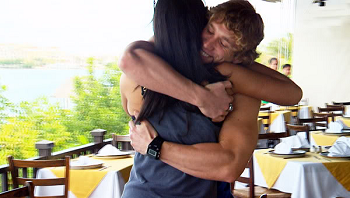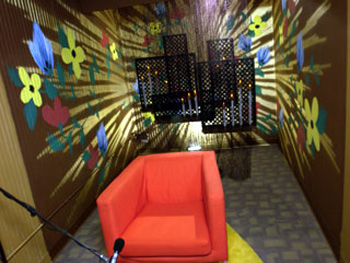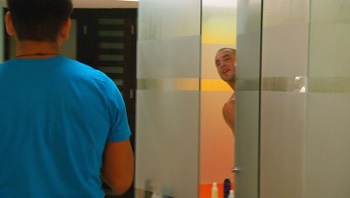I Was On MTV's The Real World: It Was Not Like You Think

When MTV decided to throw a bunch of Gen-Xers into a New York City loft and film the results -- calling it the Real World -- they basically invented reality TV as we know it today. A whole bunch of '90s kids grew up thinking some day they, too, could get famous just by hanging around and being themselves. Fast-forward about a quarter century, and we now live in a world in which every kid who doesn't have a popular Twitch channel by age five is tossed off a cliff, 300-style.
Meanwhile, the Real World is still going. We talked to "Pat," a member of the 2009 Real World: Cancun cast, to find out what really happens when people stop being polite, and start being completely aware that they're on television. He told us ...
They're Looking For A Certain Kind of Person (And Make Damned Sure They've Found It)

If you want a life of glamorous reality show stardom, step one is show up to the audition looking like the type of person who likes to start shit, but not too much shit. And then prepare yourself for some rigorous psychological testing.
It turns out that making sure all of the ingredients for a successful reality show are in place (to achieve the exact right amount of shirtless yelling) usually doesn't require scripted fakery -- it's just a matter of being very, very careful about who they cast. They are, after all, trying to cast certain "parts" (the Nice Girl, the Troublemaker, the Black Guy).

The Future WWE Champion Guy.
Pat was designated as his season's "Bad Boy." "There was a casting call at the bar, and me and my buddy were just like, 'Hey, wouldn't it be funny if one of us were picked?'" he says. "I think I had a dirty white stained t-shirt on, nothing cool." They filled out a questionnaire in line, then went inside. "There were a bunch of casting directors sitting people down in groups of ten, asking questions like 'Describe yourself in one word,'" he says. People clearly knew what the producers were looking for -- "Everyone was like 'Crazy! I'm crazy! I'm wild, you never know what I'm going to do!'" -- but just like your English teacher told you, it's all about showing and not telling. Pat finally exploded in eye-rolling frustration at one timid girl who described herself as "Um, aggressive, I guess?" He chided her, "'What do you mean 'aggressive'?! If you were aggressive, you would be aggressive."

It's the difference between drunkenly talking about
chucking a fire extinguisher into the ocean and actually doing it.
He thinks that caught the eye of the producers, who undoubtedly witnessed this slightly unnecessary confrontation and saw dollar signs. The chosen few proceeded to the next stage, where a battery of tests gave the impression they'd be trusting the cast with state secrets. "We go in the back and there's like a textbook of questions," he says. "One of them was 'List all your family members,' and I have a ton of those. They wanted to know, 'What's your relationship like with your mother, your stepmother, what was middle school like.' It was the most intimate thing -- I swear, the CIA doesn't have as much information as they do."
Pat was also required to take an IQ test ("like the MTV SATs, all these math questions") and be evaluated off-camera by a psychologist. This is all to make sure they're getting a cast with just the right amount of personality disorder. The psychologist is there "to make sure you won't be violent," he says. "If you do get violent, you're off the show." As for the rest of the probing questions, one casting official explains, "You want to see how far people will go in terms of opening up -- how much they will tell you about the guy they have a crush on or their confusing relationship with their father. You need people who are open, enigmatic, and unpredictable."

And if you can't expose yourself emotionally, doing it physically is a good fallback plan.
Just not unpredictable enough to start spontaneously raining fists down upon another cast member, although Pat points out that if someone does, "that's always what they show in the trailer." That might sound like a contradiction, but it's kind of like how NASCAR doesn't want crashes and certainly doesn't want drivers getting hurt ... but everyone involved knows a certain percentage of the audience is only watching for the fireworks.
Some Events Are Staged (But It's Mostly Small Stuff)

Every season of the Real World starts the same way, with cast members paired up and arranged to meet each other at the airport, hopefully configured for maximum conflict ("Have the gay guy meet the Southern Baptist! If at all possible, have a copy of Leviticus fall out of his suitcase!"). "On my season, when you meet 'my character,' it shows me walking out of the airport terminal, and I meet my castmate and it's like 'Hey, what's up!' that's not how it happened at all."

If racial or religious tension isn't possible,
setting cast members up to bone at the drop of a hat is an acceptable substitute.
As you can guess, MTV isn't about to let things be that spontaneous. It may not be scripted, but it's tightly controlled, to the point that the first day feels like checking in to prison. When Pat arrived in Cancun, "they took me to a separate hotel," and then, "they went through all of my stuff," mostly to ensure he wasn't packing any contraband sponsorship. "They took away like two pieces of clothing because it had brands on it, they said, 'We'll give this back to you at the end.'"

We're not saying MTV tranquilized this guy to get that American Eagle shirt off of him,
but we are saying MTV doesn't mess around.
In other aspects, the search was a little more lax. "They told me, 'Bring all your stuff down here, we wanna make sure you don't have any illegal drugs or anything' but they didn't come into my room, so if I had illegal drugs, I would have just left them in my room." At this point, of course, their psychologists had presumably calculated exactly how likely he was to do drugs and whether he'd be smart enough to hide them.
Pat's "arrival" at the airport actually took place the next day (they had him go stand off in the corner and then walk out into the view of the camera, as if he'd just stepped off the plane). That's the sort of fill-in-the-gaps shots producers do have the housemates stage from time to time (other "dramatically reenacted" events recalled by cast members include having everyone pretend to shut off the lights and go to bed just so they can get it on tape). They've also been known to hire actors as background characters to help push the plot along. In one instance, during the filming of the New York season, they paid a man to follow a female cast member and hit on her. This might be the only time getting paid to do something made it less creepy.
They Encourage Conflict In Sneaky Ways

For the most part, Pat says, "If you've got a good casting director, you don't need to anything." The conflict they want will just happen naturally. But that doesn't mean they can't help it along.
Priming the pump for drama begins soon after the battery of testing, before the show itself even starts filming. "We went to another interview at this hotel and sat in front of a green screen and they grilled me on my questionnaire," Pat says. This time, it was on-camera. "I know now why they recorded it. One, they have to send it to the people higher up, and two, if you say something relevant to something that happens later, for example, I'm totally making this up, but if for example you say something racist, they'll put it in later, like if there's a black person who's causing you trouble they'll bring up that clip of you saying 'Oh I hate black people.'"

So if you do hate black people, don't tell anyone with a camera. Also, stop hating black people, asshole.
This is one of the keys to the reality show format -- sticking the cast in front of a camera for hours and hours, wearing them down until they get material that can be inserted to juice up conflict down the line. "You know how you'll see on a reality show and two girls are in a fight and it'll cut to 'Clarissa is such a bitch lately'? What they do is, every single week, they have an interview, and the interviews would last, honest to God, four hours," Pat says. On TV, it appears to be the cast member alone talking to the camera, but in reality there are people just out of sight, asking questions and encouraging the cast member to open up. "It was almost like therapy, because they'll constantly ask 'Well how did you feel about that?' They didn't script things, but ... they would say 'You know, I can see where you're coming from, you were totally right to be mad.'"

This presumably happened less because of roommate drama,
and more because producers wouldn't shut up about the roommate drama.
Pat says he saw exactly what they were doing, when they tried to turn a total non-fight into a fight. "One time I got a little too drunk and hurt my roommate's feelings, and he's still one of my best friends to this day, so I got really apologetic and he was like 'Don't worry, it's fine.' It was nothing, it was a two-second thing. So then in my interview they would say 'Don't you think he was being over-sensitive?' and I was like 'No, not really.' And then in his interview they would say, 'Don't you think he was over-the-line?' and he was like 'No, not really.'"

Acting like real, mature adults: an unprecedented move in reality TV.
They Control The Cast By Docking Their (Skimpy) Pay

Anything that happens outside the view of the cameras is obviously useless for the show and thus represents wasted time and money. That means no one could set foot outside without making sure the production team was there, every step of the way. "We had this thing called the Batphone. It was this little red phone away from the action, and you would pick up this phone and it had no numbers on it, and it would just ring and you could ask anything. A lot of time we would just get drunk and call them. But if you wanted to leave, you had to pick up the Batphone and say 'Hey guys, I wanna go for a run or go downtown and buy some things' or 'We're going out to this club, here's 20 minutes and then we're gonna go."
So what happens if the cast members -- who, again, were often chosen because they're confrontational types -- decided not to comply? "The answer is they wouldn't pay you," Pat says. "If we broke rules, they would fine us, like $100 ... this guy would come up to me in the club and say 'You gotta go now or we'll fine you ...'"

"Screw around on our time."
Keep in mind that the Real World cast members are paid $300 a week. That may sound like plenty of money when you don't have to pay rent, but cast members likely have expenses back home if they don't want to return to find all their stuff in boxes on the curb, and rent was the only thing they didn't have to pay. "It was our only source of income, and it wasn't a lot of money," Pat says. "And we had to buy our own food, too. Aside from our living accommodations and our hookups for drinks in the club, we had to pay for everything." If they forgot to tell the producers they're running down to the gas station a couple times, they were looking at a dicey month, and MTV is absolutely petty enough to charge them for long-distance calls if their cells get shut off.
There is, obviously, no privacy, which might sound fine when they sign up for it, but doesn't really hit home until they're trying to find somewhere, anywhere, where someone won't hear them masturbate. They were mic'd while they slept, ate, and even while they shit. But there were no cameras in the bathroom, at least, Pat remembers, "so you could have your alone time there."

Sort of.
Eventually, Pat and his castmates found ways to converse in private. "One of the things you can do is, the mics can't go in the water and you're on the beach. So if we wanted to talk privately about something, you can do two things: One, you can tell them 'Hey we wanna go out to the ocean' and go talk out in the water, or two, and this is much more blatant, you could get in the pool and huddle together and whisper."
But even in the pool, there were boom mics hovering, and if they tried to edge away from them, they just followed, like the lamest horror movie monster ever.
The Biggest Sin Is Breaking Continuity

The unsung heroes of the reality show industry are the editors -- the ones who have to sift together hundreds of hours of footage of people conversing, eating and generally doing very little of interest and try to turn it into compelling television. It's not just a matter of cutting the boring stuff -- it's about creating clear stories from whatever they can grab. They're cutting and pasting bits of footage -- a little from last week, then a little from yesterday, a little from three weeks ago -- to tell a coherent story. This is how you get infamous incidents like what happened in the Real World: New York, when a romance between castmates was wholly invented by an editor (one of said cast members was in a real relationship at the time -- you can imagine their surprise when the episode aired).

They're so cute not together!
Pat had no complaints on that scale, saying that most of the editing is about making stories neater -- in one episode a cast member (Derek) has his heart broken by an ex, only to meet a new, much better dude at the end of the same episode. In reality, those two events happened several weeks apart. This is why cast members can't change their appearance mid-season. No new facial hair, piercings, anything -- they want to be able to pull video from a month ago and seamlessly piece it in to look like it happened that morning. "They would control our haircuts, we weren't allowed to get new haircuts or tattoos. I tried to grow a mustache as a joke and they said 'You have to shave it.'"

At least they didn't chain the new guy up in the basement so he wouldn't leave before filming wrapped. Probably.
This was, as the season went on, their only form of rebellion. "One time Joey got really mad that they fined him for breaking a rule, and he actually had the balls to run away from the house. No one knew where Joey was. He comes back with this brand new tattoo on his wrist that says, 'Fuck MTV.'"

And shortly after that, an eviction notice from MTV that said, "Fuck Joey."
Immortalized for only the keenest eyes to see ("There were a few times they blurred it out, but it was so small you couldn't really see it," Pat says) was a poignant symbol of a longstanding tradition among middle-class youth: The smallest possible "fuck you" to the very establishment to which they'd sold themselves. Anthropologists of the future will be thrilled.
Zoroastrianism used to be one of the biggest religions in the world, but their idea of heaven had a slight twist on it: To get there you'd have to cross a bridge, sometimes rickety, sometimes wide and sturdy. If you fell off, you'd go to the House of Lies for eternity. Fun! Not terrifying at all! This month, Jack, Dan, and Michael, along with comedians Casey Jane Ellison and Ramin Nazer discuss their favorite afterlife scenarios from movies, sci-fi, and lesser-known religions. Get your tickets here, and we'll see you on the other side of the bridge!
For more insider perspectives, check out 5 Ways You Don't Realize Reality Shows Lie and I Was A Reality TV Judge: 5 Secrets I Shouldn't Tell You.
Have a story to share with Cracked? Email us here.
Subscribe to our YouTube channel, and check out The Inevitable Future Of Parenting Reality TV Shows, and other videos you won't see on the site!
Also, follow us on Facebook, and we'll follow you everywhere.
